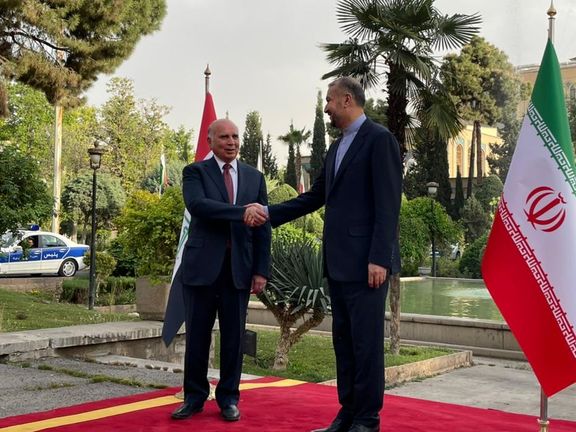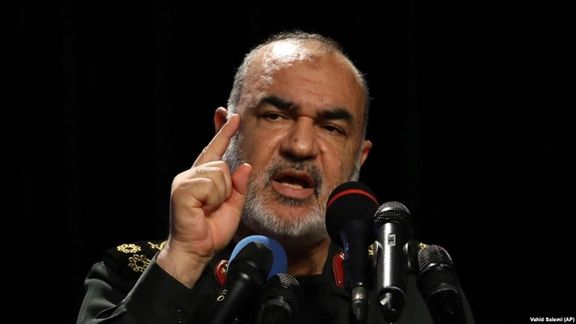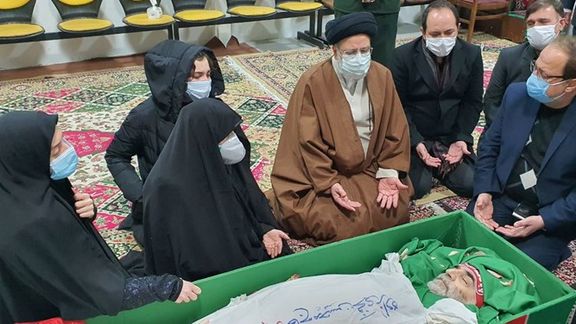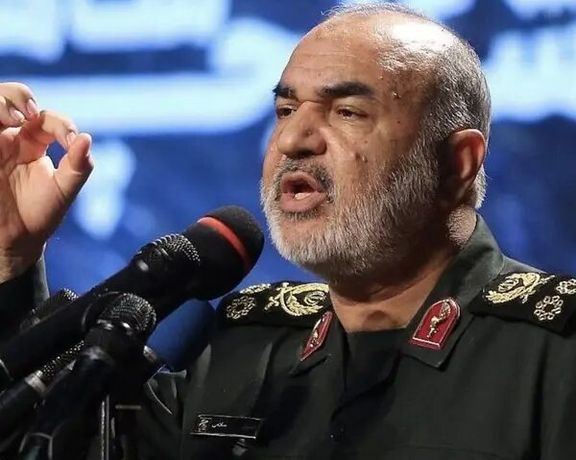Iraq Says Baghdad Hosting Iran’s Talks With Jordan And Egypt

The Iraqi foreign minister announced Thursday that Iran’s negotiations with Jordan and Egypt have started with the mediation of the Iraqi government in Baghdad.

The Iraqi foreign minister announced Thursday that Iran’s negotiations with Jordan and Egypt have started with the mediation of the Iraqi government in Baghdad.
Fuad Hussein made the remarks during an interview with the Saudi Al-Arabiya television, without giving any further details. There were no comments from Cairo and Amman on the report.
Diplomatic representation between Egypt and Iran is at the level of interest section offices since the two countries severed ties following the 1979 Islamic Revolution.
Hussein called for turning the talks between Tehran and Riyadh into a “declared dialogue”, adding that the focus of Iraqi Prime Minister Mustafa Al-Kadhimi's visit to Saudi Arabia last Saturday was the dialogue between Riyadh and Tehran, where he went the following day.
Despite all speculations and expectations, Kadhimi’s visit led to no tangible results as the visiting Iraqi premier and Iranian president did not announce any news about Tehran-Riyadh talks during their joint press conference.
Iran and Saudi Arabia -- which are locked in proxy conflicts around the region -- have held several rounds of talks in the Iraqi capital Baghdad since 2021.
It was the Islamic Republic that suspended the talks in March a day after Saudi Arabia announced it had beheaded 81 men, including seven Yemenis and a Syrian, for “heinous crimes.” Forty-one were Saudi Shiites, Human Rights Watch reported, apparently convicted over protests.
Saudi Arabia cut ties with Iran in 2016 when mobs attacked its embassy in Tehran after Riyadh executed 47 dissidents including the leading Shiite cleric Sheikh Nimr al-Nimr.

The US Department of Commerce has blacklisted 12 Chinese companies for supplying or attempting to supply Iran with US-origin electronics for the Iranian military.
“These entities use deceptive practices to supply or attempt to supply Iran with US-origin electronics that would ultimately provide support to Iran's military,” the official journal of the federal government the Federal Register said on Thursday.
The entities are added to the Entity List that means US suppliers need a license before they can ship items to the listed companies.
The companies were among 23 Chinese firms that were added to the trade blacklist this week, including five linked to arms sales to Russia since Moscow’s invasion of Ukraine. In addition to the five Chinese firms, companies in other countries such as Uzbekistan, the United Kingdom, Vietnam and Lithuania were identified as supplying military goods to the Russian military since February, when the war began.
Earlier in June, the US Thursday sanctioned Chinese, Emirati and Iranian firms over exporting Iran's petrochemicals in a measure aimed at pushing Iran to renew the 2015 nuclear deal.
Under Secretary of the Treasury for Terrorism and Financial Intelligence Brian Nelson said, “The United States is pursuing the path of meaningful diplomacy to achieve a mutual return to compliance with the Joint Comprehensive
Plan of Action,” but would “continue to use our sanctions to limit exports of petroleum, petroleum products, and petrochemical products from Iran.”

Turkish media published new details about the foiled Iranian attack against Israelis in Istanbul, saying that seven of the eight suspects were brought before a judge to extend their remand.
The Ynet news site cited Turkish outlets as revealing that the intended target of the Iranian terror cell was Yosef Levi Sfari, Israel’s former consul general in Istanbul, who was rescued by authorities and sent back to Israel.
According to reports, the Iranian agents were staying at the same hotel in which Levi Sfari and his partner Roni Goldberg were staying for their vacation, alleging that their other targets were Israeli tourists. "The Iranian squad was caught hot red-handed at the last minute," the reports added.

Turkey's National Intelligence Organization (MIT) revealed the operation last Thursday just before the arrival of Israel’s Foreign Minister Yair Lapid to Turkey, adding that the eight, who were not all Iranian nationals, were arrested in a raid in three houses in Istanbul’s Beyoglu district a week earlier.
Israeli officials and media began issuing warnings to citizens against traveling to Turkey in the end of May, citing suspected killing or abduction plots by Iran, which has vowed to avenge the May 22 assassination of a Revolutionary Guards colonel in Tehran that it blamed on Israeli agents.
Israel’s National Security Council lowered the threat level in its travel warning from high to medium on Tuesday.
Reports said on Wednesday that Egyptian security officials also warned Iran not to operate on Egyptian soil during recent meetings among intelligence officials.

In a rare move the IRGC commander-in-chief has warned about Israeli and western intelligence services’ aim to destroy the morale of their Iranian counterparts.
“The enemy wants to destroy our self-confidence, break us from within, and disillusion us, first and foremost, with ourselves,” Hossein Salami said at the inauguration ceremony of the new chief of the IRGC’s Intelligence Security (IntelSec) on Thursday.
Salami who made a rare admission of Israeli and western intelligence services’ capabilities and described them as steadfast and seasoned, claimed that despite their experience and access to complex technologies, these intelligence services have not managed to breach the barriers created by the Iranian armed forces’ intelligence security apparatuses to reach their targets in the armed forces.
Possible foreign infiltration in Iranian counterintelligence bodies, particularly by Israel, has raised alarm in Iran recently following a series of unexplained deadly attacks against IRGC officers and other breaches of security in Iran’s nuclear and military installations.
These attacks began with the highly complex assassination of Mohsen Fakhrizadeh, a key figure in Iran's nuclear program, in November 2020 near Tehran. The operation involved a one-ton remote-controlled automated weapon that had been smuggled into the country in pieces.
Israel has never officially taken responsibility for any of these assassinations and acts of sabotage but has also never denied involvement.
Israel’s alleged operations have exposed the vulnerability of Iran’s nuclear, military, and industrial facilities and individuals involved in its nuclear and missile programs, pundits say and caused confusion and suspicions of infiltration of the rank and file in security bodies.

Such operations are apparently meant not only to harm individuals and facilities but also as psychological warfare to destroy the self-confidence of the many security bodies in charge of protecting them.
“An earthquake has taken place in Iran’s security and intelligence bodies,” Mohsen Sazegara, expatriate political dissident told Iran International.
Sazegara, one of the founders of the IRGC after the victory of the Islamic Revolution of 1979, opined that an extensive purge is likely to happen in these bodies in the coming weeks and months as they seem to have been highly infiltrated by foreign intelligence services.
Supreme Leader Ali Khamenei on Monday appointed Brigadier General Majid Khademi, former head of the Defense Ministry’s IntelSec, as the IRGC’s new intelligence security chief. The change is considered as a pivotal move by Khamenei.
Khademi’s appointment followed a series of similar high-level changes in the IRGC Intelligence Organization (SAS) last week.
Khademis predecessor, Mohammad Kazemi, was introduced by the IRGC commander-in-chief as the successor of the controversial cleric Hossein Ta’eb as chief of SAS last week.
On Saturday, two days after Ta’eb’s dismissal, which officials say was a mere shift in positions, the head of the IRGC's special unit responsible for the Supreme Leader’s protection (Sepah-e Vali-ye Amr) was also replaced.
Citing officials with close ties to the IRGC who spoke on condition of anonymity, the New York Times on Wednesday reported that Brigadier General Ali Nasiri, a senior commander in the IRGC Intelligence Security, was secretly arrested on suspicion of spying for Israel. The arrest came before the Guards’ intelligence chief, Hossein Ta’eb, was replaced after 13 years at the helm of the organization last week.
This, one of the sources quoted by the New York Times said, followed the arrest of several dozen employees of the defense ministry’s missile development program were arrested on suspicion of leaking classified military intelligence, including design blueprints of missiles, to Israel.

The UK, France and Germany called on Iran to stop and reverse its nuclear escalation, return to full cooperation with IAEA and seize the offer on the table without further delay.
In a Thursday statement ahead of a Security Council meeting on the implementation of resolution 2231 that endorsed the 2015 nuclear deal, the E3 said, “Unfortunately... Iran once again refused to seize the opportunity and, instead, made new extraneous and unrealistic demands,” referring to indirect Tehran-Washington talks held in Doha this week.
Criticizing Iran’s installation and use of additional advanced centrifuges and the removal of the International Atomic Energy Agency’s JCPOA-related surveillance and monitoring equipment, they said some of the most serious steps to accelerate the pace of Tehran’s nuclear program have been taken during the negotiation process aimed at returning Iran and the US to the Joint Comprehensive Plan of Action.
Expressing deep concerns over Iran’s increasing uranium stockpiles enriched to 20-60 percent purity, the E3 said, “Iran’s complete termination of key JCPOA-related transparency measures is therefore a particularly negative, counterproductive and provocative step, which the UN Security Council cannot remain silent on.”
They also denounced Iran’s “provocative” launch of the Zolfaqar Satellite rocket, which could be capable of delivering nuclear weapons and can be used to construct long-range and intercontinental ballistic missiles.
“We strongly condemn Iran’s continued destabilizing activity in the region and call upon Iran to stop all ballistic missile activities and proliferation inconsistent with UNSCR 2231,” they concluded.

After repeated incidents showing widespread infiltration in its intelligence and security networks reportedly by Israel, Iran’s IRGC admitted its counter-intelligence was targeted.
During a ceremony to introduce the new IRGC counter-intelligence chief on Thursday, Revolutionary Guard’s commander Hossein Salami acknowledged the experience and expertise of Israeli and Western intelligence agencies, saying that “the enemy seeks to strip us of our self-confidence and make us feel empty inside.”
Calling on all commanders, officials and all the Revolutionary Guards to foil enemies’ plots, he said, “This is the most dangerous and mysterious kind of aggression... The enemy's most successful experience is in its intelligence operations."
“The Intelligence Protection Organization of the Islamic Revolutionary Guard Corps is engaged in direct confrontation with all the experienced and skilled intelligence and security services,” Salami said, admitting that they “have the collapse of many regimes on their record.”
On Monday, Brigadier General Majid Khademi, the head of the Defense Ministry’s Intelligence Security, was appointed by the Supreme Leader to succeed Mohammad Kazemi as the new chief of the IRGC Intelligence Organization’s information security (SAS InfoSec).
Kazemi replaced the controversial cleric Hossein Ta’eb as chief of the IRGC Intelligence Organization (SAS). Ta’eb’s replacement after 13 years at the helm of SAS which was announced on June 23 came as a big surprise and fueled many speculations about the reasons for his dismissal.
The SAS IntelSec is responsible for protecting the IRGC against infiltration by undesirable political fractions and leakage of information as well as monitoring of the forces’ commanders and the staff.